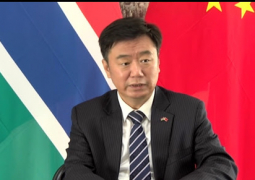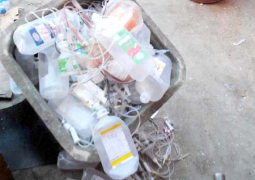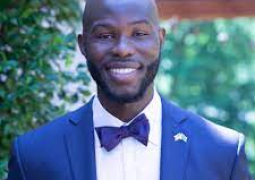In The Gambia, trauma is an often overlooked yet pervasive issue that shapes the lives of countless individuals. From the bustling streets of Banjul to the remote villages dotting our landscape, the scars of trauma run deep, affecting both the body and the mind in profound ways. It is time we shed light on this silent epidemic and understand how our experiences, especially those in childhood, can leave lasting imprints on our well-being.
Trauma is not discriminatory; it affects people from all walks of life, regardless of age, gender, or socioeconomic status. In our Gambian context, trauma often stems from a wide range of experiences, some of which are deeply rooted in our cultural practices and social norms. Sexual molestation, domestic violence, abandonment, female genital mutilation (FGM), drug and alcohol abuse, and divorce are just a few examples of the traumatic events that can shape an individual's life.
When an individual experiences trauma, their body and brain undergo a series of physiological and neurological changes that can have lasting effects on their physical and mental health. The body's stress response system, known as the hypothalamic-pituitary-adrenal (HPA) axis, is activated, releasing a flood of stress hormones such as cortisol and adrenaline. These hormones prepare the body for "fight, flight, or freeze" responses, increasing heart rate, blood pressure, and muscle tension. Over time, chronic activation of the stress response system can lead to a range of physical health problems, including cardiovascular disease, digestive issues, and weakened immune function.
Neurologically, trauma can alter the structure and function of the brain, particularly in areas involved in emotion regulation, memory processing, and threat detection. The amygdala, which plays a key role in processing fear and emotional memories, may become hyperactive, leading to heightened anxiety and reactivity to stress. The hippocampus, which is involved in memory consolidation and retrieval, may shrink in size, contributing to difficulties with memory and learning. The prefrontal cortex, which is responsible for executive functions such as decision-making and impulse control, may also be impacted, leading to challenges with regulating emotions and behavior. These neurological changes can contribute to the development of mental health conditions such as post-traumatic stress disorder (PTSD), depression, and anxiety disorders. Understanding the physiological and neurological impacts of trauma is crucial for developing effective interventions and support systems for individuals who have experienced traumatic events.
When we experience trauma, particularly during our formative years, it can therefore have a lasting impact on our physical and mental health. The body and mind are intricately connected, and the effects of trauma can manifest in various ways. Children who experience sexual molestation, for instance, may struggle with feelings of shame, guilt, and low self-esteem well into adulthood. They may also develop physical symptoms such as chronic pain, headaches, or digestive issues, as the body holds onto the memories of the trauma.
Domestic violence, another pervasive issue in our society, can lead to a range of psychological and emotional challenges. Children who witness or experience violence in the home may struggle with anxiety, depression, and post-traumatic stress disorder (PTSD). They may also have difficulty forming healthy relationships later in life, as their understanding of love and trust has been distorted by their traumatic experiences.
Female genital mutilation, a practice that is still prevalent in some parts of The Gambia, can cause immense physical and emotional pain. Girls who undergo FGM may experience severe complications, including infections, chronic pain, and difficulties during childbirth. The psychological effects can be equally devastating, with many women reporting feelings of betrayal, anger, and a loss of trust in those who were meant to protect them.
Drug and alcohol abuse, often used as coping mechanisms for unresolved trauma, can further compound the effects of trauma on the body and mind. Substance abuse can lead to a range of physical health problems, including liver damage, heart disease, and cognitive impairments. It can also exacerbate existing mental health issues, making it more difficult for individuals to process and heal from their traumatic experiences.
Divorce, while not inherently traumatic, can be a significant source of stress and upheaval for children. The breakdown of the family unit can lead to feelings of abandonment, insecurity, and a sense of loss. Children may struggle to adjust to new living arrangements, financial instability, and changes in their support systems, all of which can contribute to the development of trauma.
In The Gambia, the concepts of "Munnyal" (endurance) and "Sutura" (secrecy) often suggest suffering in silence. These cultural norms can make it challenging for individuals to seek help or speak out about their traumatic experiences. In a world where mental health services are virtually non-existent, we end up being broken souls navigating the dusty, hot streets of the country with a vacancy in our eyes that suggests survival, not hope or optimism, is our daily true north.
It could be argued that we are a traumatized nation. The effects of trauma can be seen in the way we interact with one another, in the way we raise our children, and in the way we cope with the daily struggles of life. When trauma is left unaddressed, it can be passed down from one generation to the next, creating a cycle of pain and suffering that is difficult to break.
One way to break the cycle of trauma is to recognize its most horrific manifestations in adults and prioritize psychological safety in our younger generation to prevent normalizing trauma. As Frederick Douglass once said, "It is easier to build strong children than to repair broken men." By investing in the emotional and psychological well-being of our children, we can create a future where trauma is no longer a defining feature of our society.
This investment begins with education and awareness. We must educate ourselves and our communities about the signs and symptoms of trauma, as well as the long-term effects it can have on an individual's life. We must also create safe spaces for individuals to share their experiences and seek support, without fear of judgment or stigma.
Trauma-informed care, which recognizes the impact of trauma on an individual's life and seeks to provide support and resources for healing, is essential in our Gambian context. This approach involves educating healthcare providers, social workers, teachers, and community leaders about the signs and symptoms of trauma, as well as providing evidence-based interventions to help individuals process and cope with their experiences.
Traditional Gambian healing practices, such as community rituals and storytelling, can also play a powerful role in the healing process. By integrating these practices with modern therapeutic approaches, we can create a holistic framework for trauma recovery that is culturally relevant and effective.
As we navigate the complex landscape of trauma in The Gambia, it is crucial that we approach this issue with compassion, understanding, and a commitment to change. By shining a light on the "trauma trail" that so many individuals carry with them, we can begin to foster a society that prioritizes healing, resilience, and the well-being of all its members.
One of the most powerful tools we have in this effort is empathy and compassion. When we see all our interactions with our fellow Gambians through the lens of assumed trauma in their past, we can begin to build a society that is more understanding, more supportive, and more healing. We must recognize that behind every vacant stare, every angry outburst, and every self-destructive behavior, there may be a history of trauma that has never been addressed.
By approaching one another with empathy and compassion, we can begin to break down the walls of silence and secrecy that have kept trauma hidden for so long. We can create a culture where it is okay to talk about our experiences, where it is okay to seek help, and where it is okay to prioritize our own healing and well-being.
In doing so, we can begin to build a Gambia that is more resilient, more compassionate, and more whole. We can create a future where our children are not burdened by the traumas of the past, but are instead free to explore their full potential and live lives of purpose and meaning.
The road ahead is not easy, but it is one we must walk together. By recognizing the prevalence of trauma in our society, by investing in the emotional and psychological well-being of our children, and by approaching one another with empathy and compassion, we can begin to heal the wounds of the past and create a brighter future for all Gambians.
Remember, the body and mind keep the score, but with the right support and resources, we can begin to rewrite the narrative of trauma in our lives and communities. Let us work together to create a Gambia where no one has to suffer in silence, and where every individual has the opportunity to thrive, regardless of their past experiences.
In peace, love, and good health,
Dr. IDB.
For more information, follow the work of Dr. Badjie and his Innovarx WOW team on www.igh.gm and on social media @innovarxglobal or call +2866200.
Disclaimer: The information provided in this article is for general understanding and does not constitute a diagnosis. For specific concerns or detailed health advice, always consult your designated healthcare professional.
Read Other Articles In Health




